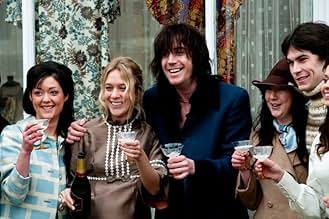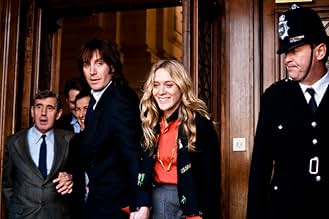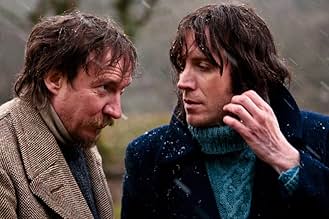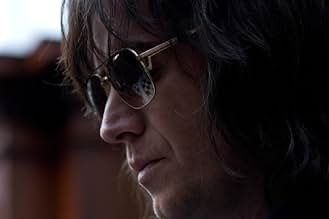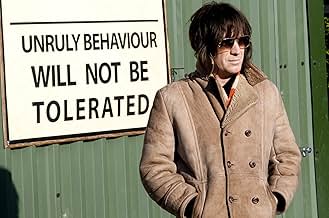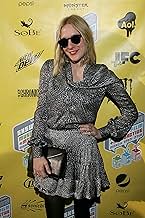IMDb-BEWERTUNG
6,3/10
8114
IHRE BEWERTUNG
Die Lebensgeschichte von Howard Marks, einem britischen Elite-Drogenschmuggler.Die Lebensgeschichte von Howard Marks, einem britischen Elite-Drogenschmuggler.Die Lebensgeschichte von Howard Marks, einem britischen Elite-Drogenschmuggler.
- Auszeichnungen
- 2 wins total
Empfohlene Bewertungen
The Pitch: Howard The Skunk.
The Review: I spent four years at University in Bath, getting a degree and starting to develop my love of movies. While I was there, I came into contact with two things for the first time in my life: drugs, and the Welsh. Not a combination that I, or indeed anyone else, would necessarily put together, but that combination was responsible for one of the biggest drug trafficking rings ever seen in this country, or indeed any other. That Welshness was contributed fairly effectively by one man, Howard Marks, described by the Daily Mail as "the most sophisticated drugs baron of all time." Not that you'd know that from watching Mr. Nice. Rhys Ifans comes across as a fairly reasonable approximation of the man himself, and this is the story of his passage from the small coal-mining village where he grew up to Oxford, and the pronounced influence that had on his future direction. Despite becoming a big fan of recreational drugs, if Mr. Nice is to be believed Marks fell into his career almost by accident, just happening to be in either the right or wrong place at the appropriate time. Slowly but surely, he expands his influence and his reach, and every time an opportunity comes up, he takes it.
In order to get what he needs, he begins to rope in a motley crew of accomplices, and ends up getting involved with the IRA (a manic David Thewlis) and eventually even expands into the Americas (via a bearded Crispin Glover), despite the protestations of his wife (Chloe Sevigny), seemingly the only person who can appreciate the potential cost of the risks that Howard's taking. Through the course of this, don't expect deep insights into why Marks is doing what he's doing, or passionate arguments for the legalisation of recreational drugs – those are only implied in the sense that this really isn't Trainspotting, and the downsides of Howard's habits are the run-ins with the law that he had, not from what he or any others ended up taking.
But freed from the weight of those expectations, this is an enjoyable romp. Bernard Rose has both adapted the screenplay and directed – his direction is unshowy, but there are little stylised touches (inserting Ifans into stock historical footage) and the occasional impressive image, but by and large he lets the story do the talking. Thewlis probably gets to have the most fun, raging around with his accent, while the only slight weak link is Sevigny, the accent wavering just occasionally and the performance also slightly shaky. There's nothing shaky about anyone else, though, they're all too tripped out on the material, so just sit back, revel in the absurdities of the story (all true, as long as you believe Marks), and have a good time, man.
Why see it at the cinema: There's a few shots, such as a car crash, that will benefit from the big screen, but by and large you'd be here more for the company than the impact of the visuals.
The Score: 7/10
The Review: I spent four years at University in Bath, getting a degree and starting to develop my love of movies. While I was there, I came into contact with two things for the first time in my life: drugs, and the Welsh. Not a combination that I, or indeed anyone else, would necessarily put together, but that combination was responsible for one of the biggest drug trafficking rings ever seen in this country, or indeed any other. That Welshness was contributed fairly effectively by one man, Howard Marks, described by the Daily Mail as "the most sophisticated drugs baron of all time." Not that you'd know that from watching Mr. Nice. Rhys Ifans comes across as a fairly reasonable approximation of the man himself, and this is the story of his passage from the small coal-mining village where he grew up to Oxford, and the pronounced influence that had on his future direction. Despite becoming a big fan of recreational drugs, if Mr. Nice is to be believed Marks fell into his career almost by accident, just happening to be in either the right or wrong place at the appropriate time. Slowly but surely, he expands his influence and his reach, and every time an opportunity comes up, he takes it.
In order to get what he needs, he begins to rope in a motley crew of accomplices, and ends up getting involved with the IRA (a manic David Thewlis) and eventually even expands into the Americas (via a bearded Crispin Glover), despite the protestations of his wife (Chloe Sevigny), seemingly the only person who can appreciate the potential cost of the risks that Howard's taking. Through the course of this, don't expect deep insights into why Marks is doing what he's doing, or passionate arguments for the legalisation of recreational drugs – those are only implied in the sense that this really isn't Trainspotting, and the downsides of Howard's habits are the run-ins with the law that he had, not from what he or any others ended up taking.
But freed from the weight of those expectations, this is an enjoyable romp. Bernard Rose has both adapted the screenplay and directed – his direction is unshowy, but there are little stylised touches (inserting Ifans into stock historical footage) and the occasional impressive image, but by and large he lets the story do the talking. Thewlis probably gets to have the most fun, raging around with his accent, while the only slight weak link is Sevigny, the accent wavering just occasionally and the performance also slightly shaky. There's nothing shaky about anyone else, though, they're all too tripped out on the material, so just sit back, revel in the absurdities of the story (all true, as long as you believe Marks), and have a good time, man.
Why see it at the cinema: There's a few shots, such as a car crash, that will benefit from the big screen, but by and large you'd be here more for the company than the impact of the visuals.
The Score: 7/10
Having watched this tonight i think i can offer a fair review , its a joke to indicate the film doesn't have grounding within the book , there just too alike for words , however the book contains long winded accounts of activity that are tedious and boring , thankfully these sections were omitted from the film , good news then ? well no , sadly also key points in Howard marks life are also not in the film , the result has sections that make no sense whatsoever to the layman , Howard appeared to move around without reason and know people without explanation , the consequences of others actions are also omitted leaving a disjointed and slightly sinister film , there is humour but its not of the lol sort , knowing the film was shot over just 2 months then i think it shows , Howard marks has led a life so rich and varied and yet it simply wasn't portrayed in this film to its fullest , it leaves you with an empty feeling in that the film felt like soup when it could so easily have been steak , Ifans could not have done a better job and the only lightweight in the cast would be Chloe sevigney who didn't have much to say and didn't display a passion in the role , over all the film IMO is worth of a 6.5/10
I hadn't read much about the film before seeing it. Afterwards, I'd say it is one part sexy, stoned, witty fun. One part light-hearted crime caper (almost, but not quite, getting too repetitive). And one part 'serious issues.' The film is very loosely inspired by the life of Howard Marks.
Part One. Howard (Rhys Ifans) goes from a tiny school in Wales to become a successful Oxford graduate, consuming large amounts of marijuana on the way (plus a tiny bit of LSD, probably a lot of sex, and a small amount of alcohol). After Oxford, he gives up drugs to become a teacher. But when a pal is stranded trying to bring a car full of resin home, he kindly steps in and finds it rather lucrative. The difference between someone who smokes and someone he deals is, as he puts it, the first smokes all they have; whereas the second has more than they can humanly smoke. He's drawn into the Secret Service in passing, who like his ability to move between borders and attract ladies.
I found Part One very funny. I have a slight problem with Rhys Ifans looking the same age at the beginning of the film as he does many years later, and after a fairly long stretch in prison. But it didn't distract me from enjoying it. His Welsh humour finds its mark, the comedic editing and timing is flawless, and for anyone over a certain age it has elements of a trip down memory lane. When David Thewlis chimes in (convincingly) as an IRA leader, Jim McCann, offering to supply planes to ferry the stuff over, heavyweight Irish hilarity meets Welsh wit. The head-on result is riotous, and yet never predictable or stilted. Add to that, my favourite fall-in-love-with-the-bad-guy actress, Ms Chloë Sevigny, and I am in for the ride.
Part Two consists of several cat-and-mouse chases as they evade capture. I did wonder if they were going to keep it up till the end of the movie, but it gives me a chance to look out for a tiny cameo by king-of-the bad-boy directors himself, Mr Ken Russell. (Look carefully or you will miss him – in the background at one of the passport check sequences.)
Part Three is when we start to see what the movie's serious undercurrent is, and it accordingly leaps in my estimation. Remember Steven Soderbergh's film, Traffic? If you came out of that thinking every sensible, well-supported argument on legalising marijuana had been made – and still there was no change in government policy – it's time to realise that rational argument is not going to change articles of faith. Can humour help? Mr Nice doesn't make moral judgements. But the natural facts speak for themselves. The main character and his associates never use hard drugs (stated emphatically). There are no perceptible harmful effects (other than Howard and friends enjoying what they do). There are considerable beneficial effects. Especially notable is the scene where a man discovers his partner being unfaithful. We expect violence. If they had been drinking alcohol – a drug with far more proved harmful effects – violence would almost inevitably followed. Instead, they get momentarily outraged: then share a joint. From my limited student experience of the dope-smoking 'scene' many years ago, this is an entirely plausible reaction. The association with 'organised crime' (here, the IRA in the form Jim McCann) is clearly a result of anti-drugs legislation, not the other way around. The misery inflicted is the emphatically the result of anti-drugs legislation, not the use of the drug (Sevigny especially comes into her element with some emotionally moving end-scenes. Yes, I did shed a tear. And Sevigny managed a very nice English accent to boot).
The filmmakers must have wondered if smoking marijuana would be decriminalised before Mr Nice was released – but the UK government, in one of the many pre-election scandals, ignored the advice of its own experts and continued to include hash in the 'war on drugs.' As Soderbergh said years ago, "We can't have a frank discussion with our policymakers - if you're in the government or in law enforcement you cannot acknowledge that drugs are anything but inherently evil and morally wrong." Bottom line: there is too much money and jobs tied up in 'drugs enforcement' to legalise them. But I should stress that this is my 'reading' of the film. Someone opposed to decriminalisation might reach an entirely different conclusion, and from watching the very same film.
On the downside, two hours of largely hash-based comedy could be very wearisome for anyone that hasn't had at least passing familiarity with the stuff. Other complaints might include Rhys Ifans not seeing him get his shirt off often enough (though I lost count of the number of times he did). Or whether Ms Sevigny used a stand-in for the brief times her shirt was off. On the plus side, it made me proud that Britain could turn out solid, constructive comedy. Rather than kitchen-sink drama based (as Ken Russell might say) on 'football in the Midlands.' Sometimes laughter, well done, can maybe reach places that common sense alone cannot reach.
Part One. Howard (Rhys Ifans) goes from a tiny school in Wales to become a successful Oxford graduate, consuming large amounts of marijuana on the way (plus a tiny bit of LSD, probably a lot of sex, and a small amount of alcohol). After Oxford, he gives up drugs to become a teacher. But when a pal is stranded trying to bring a car full of resin home, he kindly steps in and finds it rather lucrative. The difference between someone who smokes and someone he deals is, as he puts it, the first smokes all they have; whereas the second has more than they can humanly smoke. He's drawn into the Secret Service in passing, who like his ability to move between borders and attract ladies.
I found Part One very funny. I have a slight problem with Rhys Ifans looking the same age at the beginning of the film as he does many years later, and after a fairly long stretch in prison. But it didn't distract me from enjoying it. His Welsh humour finds its mark, the comedic editing and timing is flawless, and for anyone over a certain age it has elements of a trip down memory lane. When David Thewlis chimes in (convincingly) as an IRA leader, Jim McCann, offering to supply planes to ferry the stuff over, heavyweight Irish hilarity meets Welsh wit. The head-on result is riotous, and yet never predictable or stilted. Add to that, my favourite fall-in-love-with-the-bad-guy actress, Ms Chloë Sevigny, and I am in for the ride.
Part Two consists of several cat-and-mouse chases as they evade capture. I did wonder if they were going to keep it up till the end of the movie, but it gives me a chance to look out for a tiny cameo by king-of-the bad-boy directors himself, Mr Ken Russell. (Look carefully or you will miss him – in the background at one of the passport check sequences.)
Part Three is when we start to see what the movie's serious undercurrent is, and it accordingly leaps in my estimation. Remember Steven Soderbergh's film, Traffic? If you came out of that thinking every sensible, well-supported argument on legalising marijuana had been made – and still there was no change in government policy – it's time to realise that rational argument is not going to change articles of faith. Can humour help? Mr Nice doesn't make moral judgements. But the natural facts speak for themselves. The main character and his associates never use hard drugs (stated emphatically). There are no perceptible harmful effects (other than Howard and friends enjoying what they do). There are considerable beneficial effects. Especially notable is the scene where a man discovers his partner being unfaithful. We expect violence. If they had been drinking alcohol – a drug with far more proved harmful effects – violence would almost inevitably followed. Instead, they get momentarily outraged: then share a joint. From my limited student experience of the dope-smoking 'scene' many years ago, this is an entirely plausible reaction. The association with 'organised crime' (here, the IRA in the form Jim McCann) is clearly a result of anti-drugs legislation, not the other way around. The misery inflicted is the emphatically the result of anti-drugs legislation, not the use of the drug (Sevigny especially comes into her element with some emotionally moving end-scenes. Yes, I did shed a tear. And Sevigny managed a very nice English accent to boot).
The filmmakers must have wondered if smoking marijuana would be decriminalised before Mr Nice was released – but the UK government, in one of the many pre-election scandals, ignored the advice of its own experts and continued to include hash in the 'war on drugs.' As Soderbergh said years ago, "We can't have a frank discussion with our policymakers - if you're in the government or in law enforcement you cannot acknowledge that drugs are anything but inherently evil and morally wrong." Bottom line: there is too much money and jobs tied up in 'drugs enforcement' to legalise them. But I should stress that this is my 'reading' of the film. Someone opposed to decriminalisation might reach an entirely different conclusion, and from watching the very same film.
On the downside, two hours of largely hash-based comedy could be very wearisome for anyone that hasn't had at least passing familiarity with the stuff. Other complaints might include Rhys Ifans not seeing him get his shirt off often enough (though I lost count of the number of times he did). Or whether Ms Sevigny used a stand-in for the brief times her shirt was off. On the plus side, it made me proud that Britain could turn out solid, constructive comedy. Rather than kitchen-sink drama based (as Ken Russell might say) on 'football in the Midlands.' Sometimes laughter, well done, can maybe reach places that common sense alone cannot reach.
I was pleasantly surprised by this film. I honestly did not expect that I would enjoy it after having read the book.
Last year I read Joseph D Pistone's "Donnie Brasco: My Undercover Life In The Mafia" and watched the film immediately afterwards and I felt the film paled in comparison to the book. Therefore after I had read "Mr Nice" and knew there was a film adaptation I felt it would be as big a disappointment as Donnie Brasco.
On this basis I left it a couple of months after reading the book before watching Mr Nice and as a result I was pleasantly surprised by the outcome. When I put the DVD in and it starts off with Rhys Ifans in front of a crowd asking if anybody was a plains cloths officer I had my doubts about how the film would be portrayed but once the black and white prologue turned to colour I was gripped.
Obviously this is not a perfect account of Howard Mark's life as many people have said you can not translate a 600 page book into a 2 hour film without missing many parts out but I feel it was not so much a literal depiction of the book but rather a visual interpretation of Howard Mark's life using the book as a starting point. As others have mentioned it leaves out much of his life based in Hong Kong and Thailand and The Phillipines as well as the feeling of despair when confronted with being deported to the United States and even the fact the judge called the wrong outcome which is something a film would normally expand upon. Every actor in this film felt believable as the character they portray.
I enjoyed this film more than I ever expected to therefore I feel a rating of 7 is justified. However I do feel the need to criticise the few scenes that earned this film an 18 rating. Jim McCann getting his knob out and the tooth extraction scene near the end of the film felt unnecessary. Don't get me wrong I prefer films to have scenes which disgust but there is a place for that sort of thing and I did not feel this film warranted it. It could have reached a better audience had it skipped these scenes and had a 15 rating.
However I feel I may have rated this film higher than it deserves based on not being disappointed, which made me feel relieved.
Last year I read Joseph D Pistone's "Donnie Brasco: My Undercover Life In The Mafia" and watched the film immediately afterwards and I felt the film paled in comparison to the book. Therefore after I had read "Mr Nice" and knew there was a film adaptation I felt it would be as big a disappointment as Donnie Brasco.
On this basis I left it a couple of months after reading the book before watching Mr Nice and as a result I was pleasantly surprised by the outcome. When I put the DVD in and it starts off with Rhys Ifans in front of a crowd asking if anybody was a plains cloths officer I had my doubts about how the film would be portrayed but once the black and white prologue turned to colour I was gripped.
Obviously this is not a perfect account of Howard Mark's life as many people have said you can not translate a 600 page book into a 2 hour film without missing many parts out but I feel it was not so much a literal depiction of the book but rather a visual interpretation of Howard Mark's life using the book as a starting point. As others have mentioned it leaves out much of his life based in Hong Kong and Thailand and The Phillipines as well as the feeling of despair when confronted with being deported to the United States and even the fact the judge called the wrong outcome which is something a film would normally expand upon. Every actor in this film felt believable as the character they portray.
I enjoyed this film more than I ever expected to therefore I feel a rating of 7 is justified. However I do feel the need to criticise the few scenes that earned this film an 18 rating. Jim McCann getting his knob out and the tooth extraction scene near the end of the film felt unnecessary. Don't get me wrong I prefer films to have scenes which disgust but there is a place for that sort of thing and I did not feel this film warranted it. It could have reached a better audience had it skipped these scenes and had a 15 rating.
However I feel I may have rated this film higher than it deserves based on not being disappointed, which made me feel relieved.
A film that in theory couldn't go wrong with some of the stories Howard has got in his arsenal. But the film was slightly off aim; mainly by concentrating more on his family life than action packed drug deals or comedy situations. Lets face it, the reason everyone wants to read and now watch about Marks is not his loyalty as a husband or devotion as a father.
Director Bernard Rose just seemed to go the wrong way about telling the story of Mr Nice. With very dry arresting scenes which are better left played out in your head with Howard's narration or read in the book.The film does have its up points however with David Thewlis putting in a master class performance as crazy Irish IRA Jim McCann which left me half wanting the film to be all about him. Rhys Ifans played the part of Mr Nice with that particular Marks swagger which his fans know and love him for and pulls it off well.
The film has pockets of comedy which helps numb the slow two hours of product, but at times it doesn't seem to know what it is a good witty British film to an ITV drama.
Director Bernard Rose just seemed to go the wrong way about telling the story of Mr Nice. With very dry arresting scenes which are better left played out in your head with Howard's narration or read in the book.The film does have its up points however with David Thewlis putting in a master class performance as crazy Irish IRA Jim McCann which left me half wanting the film to be all about him. Rhys Ifans played the part of Mr Nice with that particular Marks swagger which his fans know and love him for and pulls it off well.
The film has pockets of comedy which helps numb the slow two hours of product, but at times it doesn't seem to know what it is a good witty British film to an ITV drama.
Wusstest du schon
- WissenswertesRhys Ifans became firm friends with Howard Marks several years before the film was made, and extracted a promise that he would star if a movie of the dealer's life was ever produced.
- PatzerWhen Howard Marks crashes his car in Ireland, it's obvious that the car went further than the film makers expected as the camera jerks untidily to the right to keep it in shot.
- Zitate
Howard Marks: A dealer is really just someone who buys more dope than he can smoke. And I have to say, I'm ashamed, I tried to smoke it all. There was just too fuckin' much of it.
- Crazy CreditsThe credits appear over a super slow motion shot of Howard Marks (Rhys Ifans) lighting and taking a toke from a joint.
- VerbindungenReferenced in Brain Blaze: The World's "Best" Drug Smugglers (2022)
- SoundtracksLazy
by Deep Purple
Top-Auswahl
Melde dich zum Bewerten an und greife auf die Watchlist für personalisierte Empfehlungen zu.
- How long is Mr. Nice?Powered by Alexa
Details
- Erscheinungsdatum
- Herkunftsländer
- Sprachen
- Auch bekannt als
- Mr Nice
- Drehorte
- Produktionsfirmen
- Weitere beteiligte Unternehmen bei IMDbPro anzeigen
Box Office
- Weltweiter Bruttoertrag
- 1.673.840 $
- Laufzeit
- 2 Std. 1 Min.(121 min)
- Farbe
- Sound-Mix
- Seitenverhältnis
- 1.85 : 1
Zu dieser Seite beitragen
Bearbeitung vorschlagen oder fehlenden Inhalt hinzufügen





